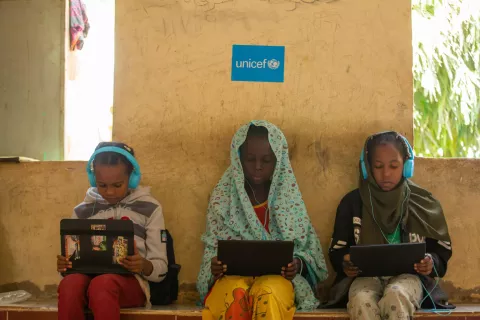In Serbia, building confidence through music
A young girl living with a disability met Ana, a teacher at a music school – and then everything changed.

- Available in:
- English
- 中文
Until recently, enroling in school had been a challenge for Petra. The local school in her hometown refused to accept her, and she and her father were forced to relocate closer to a school for children with disabilities. It was only by chance that she met Ana, a teacher at a music school – and then everything changed.
NOVI SAD, Serbia, 15 July 2016 – Outside the Isidor Bajić music school, a cacophony of piano, wind and string drifts through the crisp spring air. Upstairs, at the end of a long corridor, Petra sits upright at the piano, perfectly balanced, her back like a board and her head facing straight in front of her. Her instructor, Ana, fixes her eyes on her pupil’s hands.
“Gusto! Gusto! Gusto!” Ana repeats in rapid succession, her voice rising as the notes merge closer and closer together.
Today, Ana is trying to demonstrate the requisite amount of pressure to apply to the keys.
“What is music?” Ana prompts Petra.
“It’s a story”, she answers. They’ve been over this before.
“That’s right. You have to tell me a story through music. Not just whisper. You must be convincing in your story.”
Petra places her hand on Ana’s to get a sense of the form.
“Imagine your right hand is huge and your left is gentle like a little girl.”
Petra places her hands on Ana’s forearm and taps out the notes so that Ana can feel the pressure. This tactile pedagogical technique is unique to Ana’s relationship with Petra. Petra feels with her hands what she cannot see, and Ana brings instructions to life through metaphor.
A chance to learn
Before she met Petra, Ana had never taught a blind student. At the beginning, they spent a lot of time training Petra to position her hands correctly. Petra had a tendency to flex her palms downward, her fingers in the air, as required for reading brail or feeling her surroundings. But a more relaxed pose is required for piano, “like you’re dipping into water”, Ana explains.
Ana first met Petra when she was sitting on the panel of a music competition. The judges were impressed by the 10-year-old’s singing and touched by her determination. It was at that competition that Petra expressed her desire to study music. She passed the entrance exam at Isidor Bajić with flying colors and was enroled in Ana’s class.
At the time, Petra was attending a special school for children with disabilities. Just finding a school that would accept her had been a feat for Petra’s family. The local school in Petra’s hometown refused to enrol her, even though primary education is mandatory in Serbia. So Petra and her father left her mother and brother behind and moved eight hours north to Novi Sad.
Today, Petra attends a mainstream school. The music school helped Petra develop the confidence to make the transition to her new school. With Ana’s support, Petra was introduced to the school on the basis of her strengths as a budding young musician, not as girl defined by what she lacks. There are a few boys who tease her, challenging her to hold her jacket in one hand and her sandwich in the other. But it’s nothing she can’t handle. Petra exudes confidence. She knows what she wants and she is working hard to get there.
“My lifetime wish is to become the most famous composer and pianist.”



